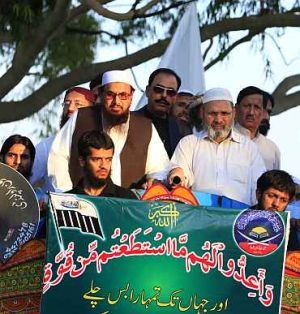 Minister for States and Frontier Region retired Gen Abdul Qadir Baloch claims Jamaat-ud Dawah has been engaged in charity and social work, operating hospitals, clinics, schools, ambulance service and religious institutions
Minister for States and Frontier Region retired Gen Abdul Qadir Baloch claims Jamaat-ud Dawah has been engaged in charity and social work, operating hospitals, clinics, schools, ambulance service and religious institutions
Pakistan has ruled out the possibility of banning Jamaat-ud Dawah led by Mumbai attack mastermind Hafiz Saeed, claiming that there is no evidence to link it with terrorism and the outlawed Lashkar-e-Tayiba.
Minister for States and Frontier Region retired Gen Abdul Qadir Baloch said the UN Security Council had in a resolution listed the JuD as LeT with a new name, but no supporting evidence had been shared with Pakistan to establish the connection, Dawn reported.
He was speaking in the Senate on behalf of Interior Minister Chaudhry Nisar Ali Khan during the question hour.
Baloch said the JuD had been under observation of authorities in terms of Section 11-D of the Anti-Terrorism Act since November 15, 2003, and will be only proscribed if a report confirming its involvement in terrorism is received under Section 11-B of the ATA.
Under Section 11-B, an organisation is proscribed if the federal government has reasons to believe that it is linked to terrorism.
The government can place an organisation under observation for six months if it is suspected of being involved in terrorist activities. The period can be extended.
Baloch claimed that JuD was engaged in charity and social work, operating hospitals, clinics, schools, ambulance service and religious institutions.
He said its offices remained shut between 2008 and 2010 but allowed to reopen after an order by the Lahore high court.
JuD is listed as a terror outfit by the UN and its chief Hafiz Saeed has a USD 10 million US government bounty against him, but Jamaat-ud-Dawa operates freely across Pakistan.
Baloch said Falah-i-Insaniat Foundation had also been listed by the UNSC as a suspected charity having links with LeT, but he did not say if it was also under observation.
He said Khuddam-ul-Islam and Jamaat-ul-Furqan charities had been proscribed by the government for having been formed in place of the banned Jaish-i-Muhammad.
Baloch said an organisation proscribed under Section 11-B of the ATA 1997 was not allowed to carry out any activity, including charity work, under a different name.
Image: JuD chief Hafiz Saeed (top left) stands atop a truck during a rally in Islamabad. Photograph: Faisal Mahmood/Reuters.





